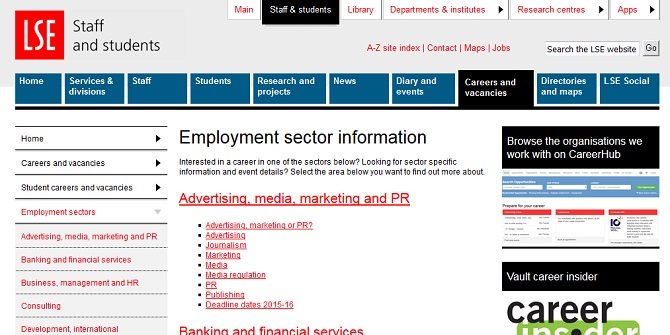Building on a series of events about moving into work outside academia, this week an LSE Careers seminar for PhD students looked at translating your academic experience into language suitable for selection outside academia. We talked specifically about addressing recruiters concerns about your fit, motivation, skills and knowledge.
Using your research skills outside academia
Employers expect holders of PhDs to have transferable skills which are not only directly associated with the topic of their PhD but also of a more general nature, appropriate for a wider range of work and for working effectively with others.
Of course, one of the key transferable skills that PhDs develop and master during their studies is the ability to do research. If you have ever thought about wanting to expand your research skills into sectors outside of academia think about the type of organisations that can use research skills. Increasingly, academics build a portfolio career whereby they work both within academia and as well as within other sectors.
One way to find out about the type of organisations that employ LSE PhD graduates with research skills is to look at the career progression of your peers. Use our graduate destinations information or browse the list at the end of this blog.
Need help making sense of your options and what you have to offer? Talk it through with the careers consultant responsible for PhD students and research staff, Catherine Reynolds in a one-to-one appointment.
Your questions answered
1. What’s in the alternative labour market?
Look at the examples at the end of this blog – it’s by LSE department but you might find interesting roles listed in related departments too. Some job titles are often repeated: consultant; analyst; researcher, for example. Some of the organisations are well known and easily recognised, others are less well known. Both deserve investigation. Keep your horizons wide!
2. Selection processes outside academia
Moving from academia to other sectors you might find recruiters have concerns about your fit, motivation, skills and knowledge. We can help you anticipate and address these concerns.
The written bit
Using job descriptions and careers information from professional bodies and personal contacts can assist the process of translating your academic experience into language suitable for selection outside academia. Looking and sounding as if you fit in the organisation you’re applying to will improve your chances of success at interview. Some examples:
They will value your experience highly if you present it effectively and adopt their terminology and discourse. Think about using phrases such as:
‘I learned from senior colleagues and peers’ rather than ‘I was supervised by Professor XYZ’.
‘I managed a large research project; met regular deadlines; collected data in a systematic and safe way’ rather than ‘methodologies used…’
‘Successfully negotiated access to…’ rather than ‘I struggled to find data’.
In person
Being one of the team (not overly critical, difficult, arrogant) and willing to adopt the behaviours of your would-be colleagues assures them you are going to stay and not rush back to academia as soon as an academic job is available. All the background careers research you do in advance will help you prepare for the selection processes. The Vitae Researcher Development Framework provides a model for reviewing skills developed during a PhD but needs to be translated in to the vernacular of a particular industry or sector.
The other tasks
Employers adopt recruitment tasks relating to their own work environment to see how candidates perform. Understanding what they are looking for and practising behaviours in advance will improve your chances. One LSE PhD candidate described successfully passing a case study exercise,
‘I treated it like a seminar discussion. Summarised the key concepts in the reading and proposed some ways forward.’
Other tests are often hard if you are not in practice. We have examples and advice on how to perform at your best.
3. How do I find vacancies and when do I start applying?
Use your research skills! A mixed approach based on web searching, CareerHub, and asking careers consultants and other professionals. Setting up appropriate feeds will also serve you well.
Start applying within the year coming up to submission. But start looking before then, collect job descriptions and other information so you have some data to get you started when you’re ready to apply.
4. What further help is there?
Careers information, resources, and advice is on the LSE Careers website and this blog. Vacancies and employer information are on CareerHub, where you can also book to get confidential one-to-one careers consultations. These are available all through the summer! The slides from our events on preparing to work outside academia are on our website.
PhD destinations by department (updated summer 2016)
This is an updated Department based list of recent career directions of PhD graduates, showing their first job after completion. Perhaps something on the list below will inspire you! If not come and talk to a Careers Consultant.
Accounting
Graduates work in the commercial sector and with international organisations; for example as a Commodities Researcher at Deutsche Bank, a project manager at Aviva, and at the European Central Bank.
Anthropology
Destinations include a Diplomat in the Ministry of Foreign Affairs; Equal Chances Better Lives (ECBL); the Open Society Foundation; Fundsmith; Musee du quai Branly; and UNDP as Researchers, Analysts, Grant Managers, and Communications experts.
Economic History
Include journalists and editors in the publishing and media industries for example as Senior Editor at Money Week; and in government as a Policy Analyst in the New Zealand Ministry of Education; as well as an economist at IMF, a Researcher at the Institute for Government, and a Portfolio Manager at the European Central Bank.
Economics
Graduates now work as economists in the OECD; ODI; the World Bank; Uni Credit; Bank of England; Bank of Canada; Bank of Italy; Bank of Slovenia; European Central Bank; Central Reserve Bank of Peru; KfW (central banking) and the Federal Reserve Board. They are working as analysts and consultants in organisations such as the European Commission; Deutsche Bank; Frontier; NERA Economic Consulting; QuBit; other economic consultancies and in strategy work at GSA Capital.
European Institute
Graduates now work in Government, EU Commission and the BBC; also as a Consultant at the World Bank; a Deputy Director of the Carnegie Endowment for International Peace; as well as working in the commercial sector in Government Affairs at Hewlett Packard.
Finance
Destinations include the International Monetary Fund; the European Central Bank; in the Federal Reserve Board and Financial Services Authority as well as roles in the commercial sector at Cornerstone Research, Eurex and the Man Group, McKinsey, JP Morgan, and as an Analyst at Deutsche Bank.
Gender Institute
Destinations include journalism and the media; and a Manager in Criminal Justice, and a Programme Manager in the charity sector.
Geography and Environment
Graduates have gone onto the private sector, for example as Principle Researcher at Amec Foster Wheeler, a researcher at Nomura and as a Consultant at PJM Economics. They also work in other sectors, for example in regional planning in Sardinia; as a Programme Leader at the Work Foundation; as an environmental economist at the World Bank; for the Office for National Statistics, the European Central Bank, for the Central Bank of Italy and as Senior Research Officers at ODI and RUSI.
Government
Destinations include the commercial sector, for example as Director of Infrastructure at Mazaars; as CEO at Artis Research and Risk Management; as Senior Analyst at Barclays; in advertising at the Academy of Ideas; and in other organisations, for example as Head of Research at ODI; Ambassador for The Grand Duchy of Luxembourg; as a Senior Analyst at the RAND Corporation; as a Social Researcher at the Department of Work and Pensions; as a Parliamentary Research Assistant in Parliament; Civil Service Fast Streamer working in social research; for the Columbian Government, and as an Expert in Delegation at the European External Action Service.
International Development
Roles include impact evaluation at the World Bank; Development Consultant at Social Development Direct; Consultant at Darlberg Development; Project Manager at Odin; an Associate at PWC; Analysts and Barclays; Policy Adviser at DIFID; Researcher at Institute for International Policy Studies.
International Relations
Destinations include the risk advisory business for a private security firm, a Defense Analyst at the BBC and political analyst at Arabia Monitor. In other organisations they are also working as Research Analysts, for example for the Federal Highways Research and at Avascent; Gender Consultant at JustImpact; as a Diplomat in the Ministry of Foreign Affairs; as a Consultant to the European Commission; for the Government of Indonesia; for the UN Commission for the Environment; as a Gender Project Coordinator at the OECD; Director at the Hanns-Seidel-Foundation; as a Programme Manager at Think Global, Deputy Director at Access to Medicine Foundation; and as Assistant Director at Chatham House.
Law
Graduates have gone onto working in international organisations, government agencies and private firms. For example, as a Human Rights Officer in the UN Office of the High Commissioner for Human Rights; as Counsel at the OPEC Fund for International Development; as a lawyer with the Financial Services Authority; legal adviser at the Competition and markets Authority; a legal officer in the Open Society Institute; a government lawyer with the Treasury Solicitors; in firms of Solicitors such as Peters and Peters; and Joseph Hage Aaronson.
Management
Destinations include the Financial Services Authority; for Morgan Stanley as an Associate; Managing Director at Wunderman; Director at BAO Systems; as a Scientific Officer at the European Commission; Consultant at Decision Strategies; Consultant at open Data Research; and as a business psychologist and a health consultant in Health Information Systems. They are also entrepreneurial starting their own enterprises, for example the Co-Founder of FreeStyl Inc.
Media and Communications
Graduates now work in the communications industry including St Clements Outreach; as an analyst at Enders Analysis; Semantico and as Coordinator at the United Nations Economic Commission for Africa (UN-UNECA) and as freelance writers and journalists, for example with Mouseion Limited.
Methodology
One PhD graduate has secured a position as a social researcher in the Office for National Statistics (ONS).
Philosophy
Most philosophy PhD graduates go on to work in Higher Education as lecturers and researchers, one moved outside recently as a teacher/researcher with Researchers in Schools.
Social Policy
Graduates have gone onto work in the OECD as an Analyst; World Bank in health economics; as an Ambassador in Ireland; as Researchers at Dartington Social Research Unit; ACTWatch; Nuffield Trust; The Women’s Foundation and Social Market Foundation and as a technical adviser at Options Consultancy, a Research Officers at the Department of Work and Pensions; the Children and Family Court Advisory and Support Service; Consultants at the Street Group Inc and for Global Health Policy; for the Centers for Disease Control and Prevention, for Her Majesty’s Courts, and as Research Manager at the BBC; and Tribunals Service in tourism development for the Government of Thailand. In the corporate sector: consultant at McKinsey and data analyst at Citi.
Sociology
Destinations include the Civil Service and in roles such as Senior Officer at the National Offender Management Service; Researcher at Homerton Hospital; Prisons Inspector at HM Inspectorate of Prisons; Manager in the New South Wales Department of Premier and Cabinet; freelance writer; website editor, and Consultant at the OECD.
Statistics
Graduates have gone into private sector roles such as a Senior Quantative Analyst at AHL Man Group and at Barclays; risk control at Pictet Asset Management; Associate at Deutsche Bank; Associate at UBS; Quantative Associate at JP Morgan; Manager at RMS Consultancy; Medical Statistician at the Wolfson Institute; and Quantative Analyst at Citi.





